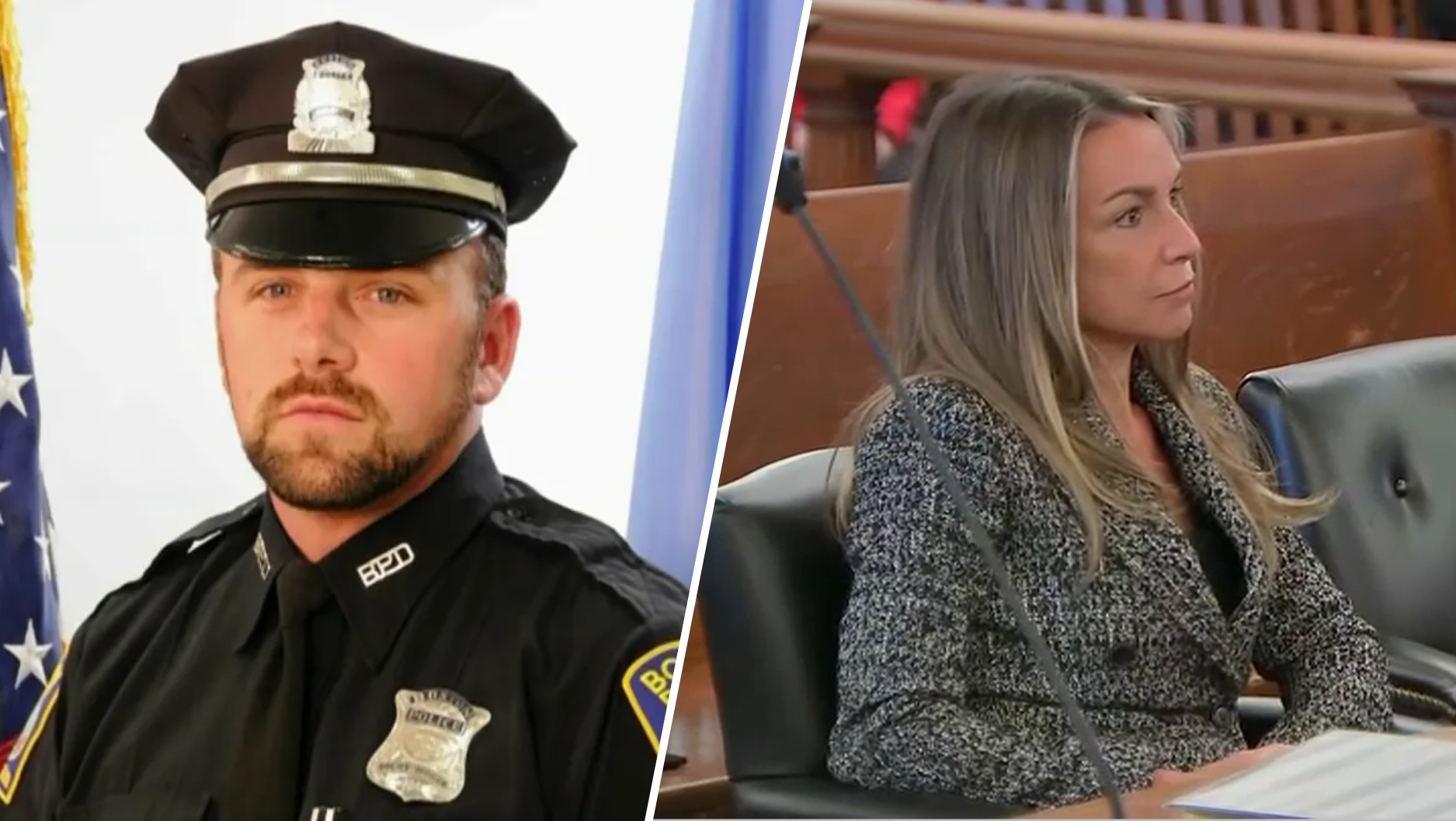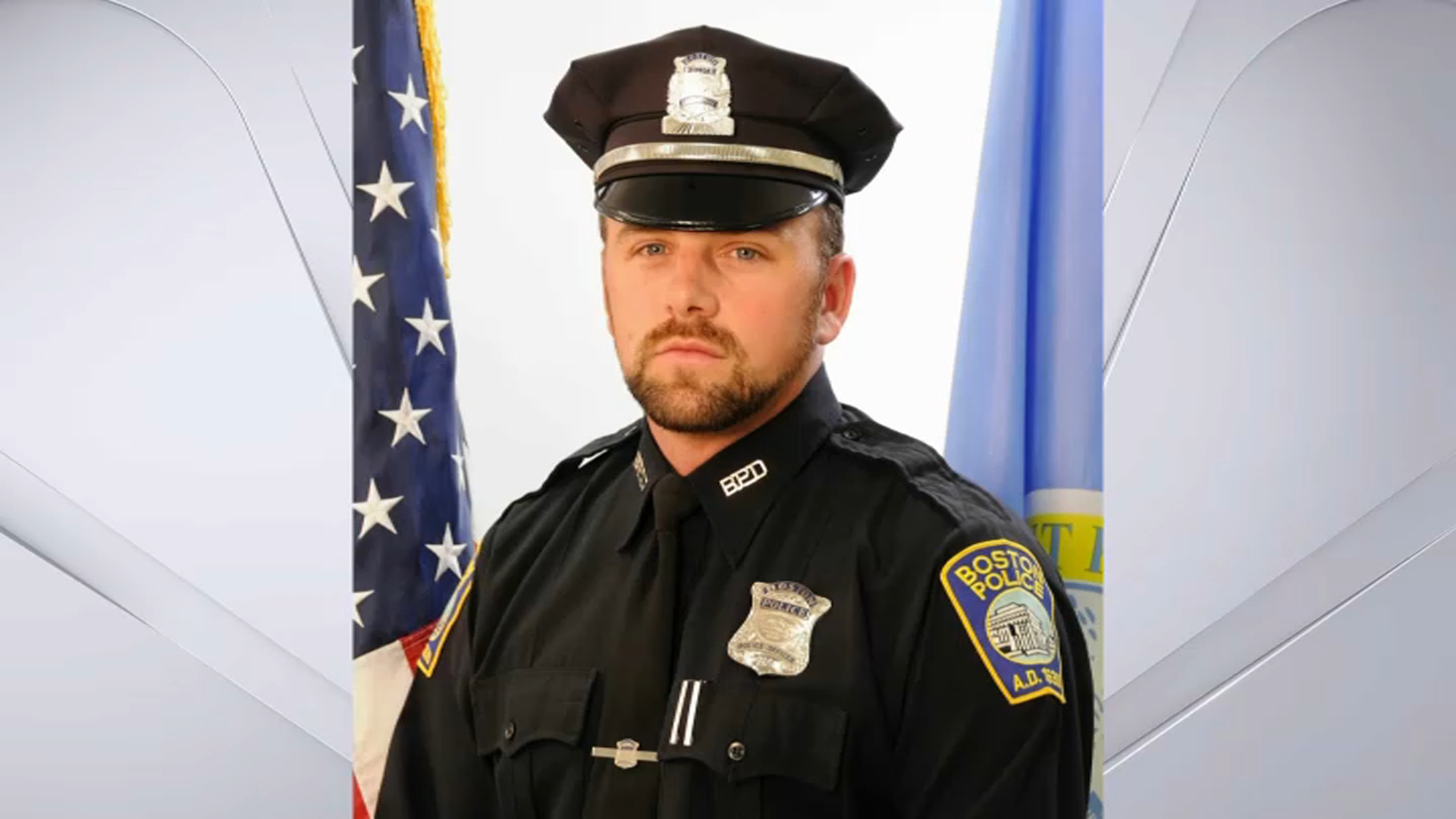Jurors returned to the courtroom Tuesday for the trial of Karen Read, where they heard testimony from police and firefighters who were among the first to respond to the scene of Boston police Officer John O'Keefe's death in January of 2022.
Testimony resumed around 9:30 a.m., about 30 minutes later than scheduled, due to a car crash on Interstate 95 in Needham that led to extended traffic delays.
Get New England news, weather forecasts and entertainment stories to your inbox. Sign up for NECN newsletters.
First on the docket was the cross examination of the police officer who arrived first on scene on the night Read allegedly killed her then boyfriend John O'Keefe, a Boston police officer. This after he provided interesting testimony Monday while answering questions from prosecutors.
Defense attorney Alan Jackson began the day Tuesday by cross examining Canton Police Officer Steven Saraf about details concerning the day O'Keefe's body was found. Saraf testified that Read attempted to perform live-saving measures on O'Keefe, while the others at the scene did not.
"At that point, it was Karen Read," he said when asked if Read or Jennifer McCabe, who was also at the scene, was more actively trying to aid O'Keefe.
McCabe is expected to be called as a witness during the trial, and the defense has claimed she searched "Ho[w] long to die in cold" hours before O'Keefe's body was found in front of the home of her brother-in-law, Brian Albert, who is also a Boston police officer. According to the defense, McCabe then tried to delete that search.
Watch the Karen Read trial live on nbcboston.com, NECN, NBC Boston streaming platforms (including Roku, Peacock and Samsung TV) and NBC10 Boston's YouTube page. Every night of the trial at 7 p.m., come back for analysis and more.
The defense showed Saraf a video, which he acknowledged showed a person walking from the area where O'Keefe was found toward the house.
"There was a person walking from the area where a body was found in the lawn of a house, walking into the house to make contact with other individuals, correct?" Jackson asked Saraf.
"It appeared that way, yes, sir," he replied.
"Does that seem appropriate to you?" Jackson asked.
"No," said Saraf.
Read's attorneys have questioned why investigators did not go into the home or talk to the homeowners after O'Keefe was found. Saraf defended this Tuesday.
"Do you think that would have been appropriate protocol, when dealing with a body laying on a lawn, that is partially unclothed, to look inside the house of the lawn?" Jackson asked Saraf.
"No," he replied.
"You didn't think that would have been appropriate protocol?" the defense attorney asked.
"No," Saraf said again.
"For you or anybody else?" Jackson continued.
"No," the officer repeated.
Speaking with NBC10 Boston Tuesday evening, security analyst Todd McGhee, a retired Massachusetts State Police trooper, called the police investigation described in Saraf's testimony into question.
"As a law enforcement investigator, the first thing you're looking for are facts. Facts lead to evidence, evidence can be gleaned from eyewitness accounts, from the Ring doorbells, anything that can help you stitch this mystery back together again," he said. "And the fact that the investigation wasn't thorough provides a big wrinkle in the prosecution's case."
He elaborated that it does not make sense for investigators not to pursue evidence from the house or accounts from those inside.
"It does not ring true, because if I can find one person to help me spell out the story, to help bring some clarification, anything -- was there another vehicle close by? Was there another eyewitness, as a neighbor, that I might be able to go and speak to?" McGhee said.
Saraf also acknowledged a discrepancy between what was in his initial written report and his claim months later that Read said "This is my fault, I can't believe this happened."
"Nowhere in your official report did you say that," Jackson said. "And nowhere in your interview with Trooper Proctor the next day did you say that."
Saraf said this was correct.
"You think that was a pretty important omission on your part?" Jackson asked.
"It was an oversight," the officer answered.
"An oversight that a woman who you made contact with, standing over the body of a fallen police officer, said to you, 'This is my fault?' You just missed that one?" Jackson asked.
"Yes, I missed it, yeah. I didn't write it down," Saraf said.
Lally asked Saraf if his testimony to the grand jury and at trial about what Read said is accurate by his memory, to which the officer replied, "Yes."
The day's second witness was Canton Police Officer Stephen Mullaney, another officer who responded to the scene on the day O'Keefe's body was found.
He testified about his distance from the incident, the route he took, the amount of time it took him to get there, and others he saw at the scene, including Saraf, O'Keefe, Read and McCabe. He testified that there was no snow on O'Keefe's body, but that it was clear he had been "in the conditions," with water frozen to his face. He said he did not notice any injuries on O'Keefe's body at that time.
As O'Keefe was being put into an ambulance, Mullaney said Read repeatedly screamed, "Is that my boyfriend? Is he dead?"
Defense attorney David Yannetti cross examined Mullaney afterward, asking the officer whether he saw Read attempting to perform CPR at the scene.
Mullaney said he did notice Read was hysterical, screaming, and appeared to be distraught and in shock.
McCabe was not, the officer testified.
"She was not screaming, she was not yelling," Yannetti said. "She was not hysterical. She was not distraught. She was calm."
Mullaney also confirmed Saraf's account that Read repeatedly screamed "Is that my boyfriend? Is he dead?"
Also called to testify Tuesday was Timothy Nuttall, a Canton firefighter and paramedic who was among the first to respond to the scene where O'Keefe's body was found. He testified that when he arrived there were three women huddled around what appeared to be a human form laying in the snow.
Nuttall said he found the body of a man, later identified as O'Keefe, laying on its back in the snow.
"I immediately went to him and checked him for signs of life," he said. "We found none -- we found no breathing, no pulse -- so we immediately began performing high-quality CPR."
Nuttall said there was a small pool of blood that seemed to be underneath O'Keefe, but it was hard to see in the darkness.
He testified that O'Keefe had a hematoma, or "an egg" on the right side of his face, just above his eye on the forehead, and scratches on his right upper arm.
"The individual was cold all around to the touch," Nuttall said. "His nose was also quite cold, quite white, just because he had been in the elements for a while. There appeared to be a little blood on his nose as well. All of his digits were cold, immobile, stiff, I assume due to the elements."
He said at one point he asked the women what happened, and one of them replied several times, "I hit him, I hit him." He said he couldn't identify the woman, other than to say that she had blood on her face, apparently from having performed CPR.
During cross examination, Jackson tried to establish that the hematoma on O'Keefe's head could have been the result of being in a fight. Nuttall said there could be multiple explanations for the injury, but didn't rule out a physical altercation.
Jackson also attempted to cast doubt about Nuttall's ability to recall the events on the night of O'Keefe's death.
"Nobody's casting aspersions. Memory's a funny thing," Jackson said.
The final witness of the day was Canton fire Lt. Anthony Flematti, another one of the first responders to the scene of O'Keefe's death. He was asked a series of questions about his response to the scene, similar to what had been asked of Nuttall.
He described the snowy conditions on the day of the response, with messy roads and darkness.
The first thing he observed as he pulled up to the scene was two women who were going back and forth between a body and the side of the street, one of whom appeared to be pushing on the man's chest.
Court adjourned just before 1 p.m. and court will not be in session on Wednesday. Thursday will be a half day.
The high-profile murder trial began Monday with heated debates between the defense and prosecutors.
Prosecutors say Read hit O'Keefe with her SUV, leaving him to die on the lawn of a Fairview Road home in Canton, Massachusetts, after a night out with friends back in 2022. Her defense claims it was a cover-up by law enforcement.
Read's defense team wasted no time attempting to prove that claim, accusing law enforcement of planting broken taillight evidence, ignoring the accounts of a snowplow driver who says he never saw O'Keefe's body on the front lawn and overall, raising questions as to how the investigation was handled.
Prosecutors and the defense each had about 45 minutes Monday morning to deliver their opening statements.
Norfolk Assistant District Attorney Adam Lally outlined the Commonwealth's case, saying that Read even said, "I hit him, I hit him, I hit him," in the hours after O'Keefe's death. He indicated that jurors will hear from some of the people who were inside the house where O'Keefe was found and from investigators involved with the case.
Lally also referenced a 20-minute shouting match that Read and O'Keefe reportedly had during a vacation in Aruba about a month before O'Keefe's death.
The defense argued that Read is being framed and someone else is responsible for O'Keefe's death. But they didn't say specifically who they think that person is.
The judge had previously ordered that the defense can't make its third party culprit argument during opening statements. Instead, they have to "develop their argument, through relevant, competent, and admissible evidence over the course of the trial."
"Karen Read was framed," Yannetti said in his opening. "Her car never struck John O'Keefe, she did not cause his death, and that means someone else did."
He argued that the lead investigator on the case, Massachusetts State Police Trooper Michael Proctor, had "deep ties" to the Albert family, the owners of the home outside which O'Keefe's body was found, and that the investigation into O'Keefe's death was not conducted properly.
"Michael Proctor never stepped foot inside the Albert home on Jan. 29 of 2022, never checked out whether there were any signs of struggle inside that home, never called for crime scene technicians and other specialists to look out for blood or other trace evidence in the home. He never asked Brian Albert for permission to go inside the home... never applied for a search warrant to go in that home. Instead, he focused immediately and exclusively on Karen Read, the outsider."
Yannetti said on the day that O'Keefe was found dead, Proctor was texting with his high school friends, revealing information about the investigation and his "true thoughts" about Read.
"He called Karen Read names you would reserve only for your worst enemies. He told his friends that he hoped she would kill herself, he told his friends he had seized her cellphone." He said Proctor even told his friends that he was "searching her phone for nude photos of Karen Read."
Yannetti said Proctor also texted his friends that the Alberts wouldn't face any issues despite the fact that O'Keefe had died on the lawn, because "the homeowner is a Boston cop too."
Proctor is currently the subject of an internal investigation by Massachusetts State Police that sources have confirmed is connected to the Read case.
Yannetti also alleged that O'Keefe's injuries were not consistent with being hit by a vehicle, but rather an attack by an animal. And he said the Alberts owned a German Shepherd that was known to be "not great around strangers." He also said the dog, named Chloe, was rehomed several months after O'Keefe's death.
On the first day of the trial, O'Keefe's brother, Paul, and Paul's wife, Erin, were called to testify. Saraf also began his testimony Monday, reiterating his claim that he found Read "visibly upset" and saying, "This is all my fault, my fault. I did this."
The trial is expected to last six to eight weeks.
Sign up for our Breaking newsletter to get the most urgent news stories in your inbox.




